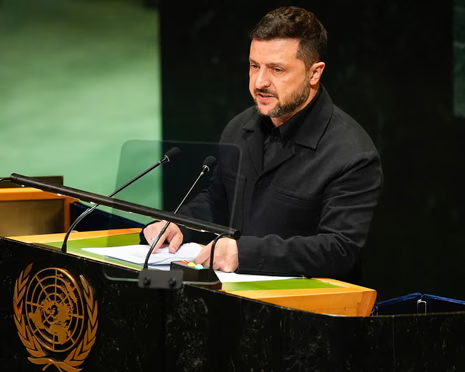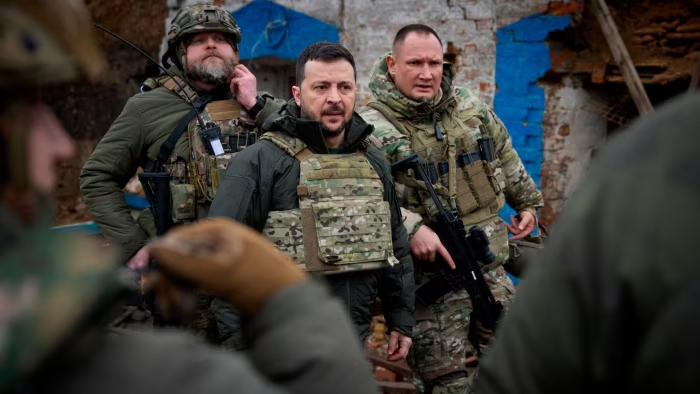“The Ukrainian president didn’t mince words. At the UN, Zelenskyy painted a grim picture of a world sliding into the deadliest arms race humanity has ever seen.”
When Ukrainian President Volodymyr Zelenskyy stood before the United Nations, his words weren’t just about Ukraine—they were about all of us. With a voice that carried urgency, he warned that Russia’s ongoing aggression isn’t only fueling a brutal war, but also driving what he called “the most destructive arms race in human history.”

It was more than a speech. It was a plea for global leaders to recognize that the stakes go far beyond one conflict. Zelenskyy framed the war as a threat to international security, a warning that unchecked militarization could push the world into dangerous new territory. His message was clear: if the world doesn’t act now, the cost tomorrow could be far greater.
Zelenskyy’s Message at the UN
In his latest Zelenskyy UN address, the Ukrainian president did not hold back. With the world watching, he painted a stark picture of the dangers ahead if Russia’s aggression continues unchecked. Zelenskyy warns UN delegates that the Ukraine war is not just about territory—it’s about a global slide into what he called “the most destructive arms race in human history.”
His Ukraine Russia war speech carried both urgency and frustration. Zelenskyy reminded leaders that every missile strike and every escalation by Moscow risks setting off a chain reaction, pushing other nations to expand their own arsenals. To him, this isn’t only Ukraine’s fight—it’s the world’s problem.
The heart of his message was clear: without stronger international unity and concrete action, the conflict could spiral into something far bigger than the borders of Ukraine. For Zelenskyy, silence or hesitation from the global community is not an option.
What He Meant by ‘Most Destructive Arms Race
When Zelenskyy spoke of the “most destructive arms race in human history,” he wasn’t using empty words. He was pointing to the dangerous cycle that begins when one nation escalates its military power and others feel pressured to follow. In this case, Russia’s aggression in Ukraine—and its growing military partnership with other authoritarian regimes—sets off alarm bells worldwide.
An arms race doesn’t just mean more tanks and missiles. It means billions of dollars pulled away from education, healthcare, and innovation, and funneled into building weapons that could devastate humanity. Zelenskyy warned that if countries fall into this trap, we may see nuclear ambitions resurface, advanced weapons spread, and a world where conflict is always one miscalculation away.

Unlike past arms races, this one feels more unpredictable and more global. Technology, cyber warfare, and long-range missile systems raise the stakes far higher than they were during the Cold War. Zelenskyy’s warning is a reminder that unchecked militarization could make every corner of the world less safe.
Global Reactions to Zelenskyy’s Warning
Zelenskyy’s words at the UN did not fall on deaf ears—but the reactions highlighted just how divided the world remains. Some leaders echoed his concerns, agreeing that Russia’s actions are pushing the planet closer to instability. They spoke of solidarity with Ukraine and emphasized the urgent need for collective action to stop the spread of this dangerous arms race.
Others, however, were more cautious. For some nations, economic ties to Russia or fears of escalating tensions kept their responses muted. While allies like the United States and European Union states pledged continued support, leaders from parts of Africa, Asia, and Latin America pushed for diplomacy and negotiations instead of direct confrontation.The mixed response reflects the global challenge Zelenskyy faces: rallying a fractured international community around a common goal. His UN warning was designed to shake leaders out of complacency, reminding them that this war is not just Ukraine’s burden to carry—it’s a looming test for global security as a whole.
Impact on Ukraine and Beyond
For Ukraine, the impact of Russia’s aggression is tragically clear. Cities lie in ruins, families are torn apart, and millions have been displaced from their homes. The human cost is staggering, and every new strike only deepens the wounds of a nation fighting for survival. Zelenskyy’s message at the UN comes from this painful reality—he sees firsthand what unchecked militarization looks like.
But the consequences don’t stop at Ukraine’s borders. Energy prices have spiked across Europe, food supplies have been disrupted in parts of Africa and the Middle East, and global markets remain on edge. What happens in Kyiv or Kharkiv is felt in Berlin, Cairo, and New York. The Ukraine war has become a reminder that in today’s interconnected world, conflict in one region ripples across the globe.
Zelenskyy’s plea is not only about defending his country—it’s about protecting stability, democracy, and security for all. If the war continues to escalate, the risks of a broader crisis, whether economic or military, grow harder to ignore.
FAQs
1. What did Zelenskyy say at the UN?
In his UN address, Zelenskyy warned that Russia’s aggression is fueling what he called “the most destructive arms race in human history.” He urged world leaders to act together to prevent further escalation.
2. Why did Zelenskyy call it an arms race?
He used the term to describe how Russia’s growing militarization could push other nations to increase their weapons stockpiles, raising the risk of global instability and potential nuclear escalation.
3. How are world leaders reacting to his speech?
Reactions have been mixed. Western allies pledged support for Ukraine, while some nations called for negotiations instead of confrontation. This division shows how difficult it is to unite the world around a single course of action.
4. Why does the Ukraine war matter to other countries?
The war’s effects extend far beyond Ukraine—fuel prices, food supply chains, and global security have all been disrupted. What happens in Ukraine can influence economies and peace worldwide.
5. What is Zelenskyy asking from the UN?
He is calling for stronger international unity, concrete action to stop Russia’s aggression, and a commitment to prevent the spread of a dangerous arms race.